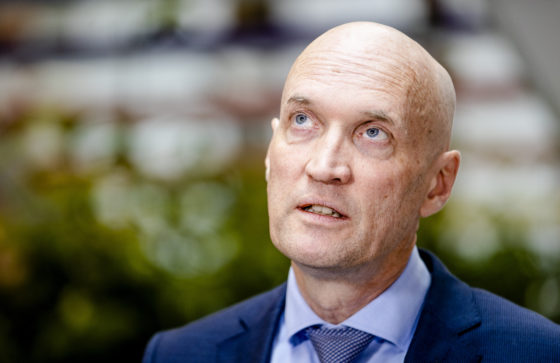Kuipers: more IC beds will not stop coronavirus wave, focus on prevention


Health minister Ernst Kuipers has said increasing intensive care capacity is not the way to tackle a potential new wave of coronavirus infections later in the year.
In an interview with Nieuwsuur, Kuipers said there was a ‘high’ chance of the virus returning, but social and business sectors and individuals shared the responsibility for keeping infections under control.
The health ministry this week outlined its long-term strategy for managing the virus, which focuses on avoiding lockdowns by creating sector-specific plans for education, catering, travel and other parts of society where the risk of infection is high.
But Kuipers, who was previously head of the LCPS, the body set up to co-ordinate the transport of coronavirus patients between hospitals in order to avoid bottlenecks in the system, said preventive measures were more effective than adding intensive care beds.
‘Millions of people were infected during the coronavirus period,’ he said. ‘We had periods when the number of infections increased by 70% in a week. If the capacity in intensive care is 20% higher you can cope for another two days.’
There are currently 26 patients in intensive care with coronavirus, accounting for around 6% of all people in hospital who have tested positive, compared to 40% at the peak of the Delta wave last year.
Intensive care specialists have said raising capacity is not an option for another reason: the lack of trained personnel to staff the units. Iwan van der Horst, chair of the intensive care association NVIC, told Nieuwsuur at the weekend that hospitals are still working through a waiting list of between 100,000 and 120,000 people.
Van der Horst said some extra nursing staff had been trained in the last few years, but a similar number had left the profession. ‘We want to keep growing so that we can have more beds open with more people. So that if there is another wave we can accommodate them better.’
Social impact
The long-term strategy aims to balance the need to limit the spread of the virus with the social and economic consequences of pandemic control measures, under the slogan: ‘The Netherlands is open and we want to keep it that way’.
Kuipers said: ‘Corona is not going away and the chance that infections will start rising again at some point is high. We need to bear that in mind.
‘This is the moment when we need to be as well prepared as possible. That makes demands of the government, me and my staff, but also sectors and citizens.’
The government has set up a social impact team (MIT) chaired by former GroenLinks party leader Jolande Sap, as a counterweight to the outbreak management team which advised the government on pandemic restrictions for the last two years.
Kuipers said he wanted to avoid drastic measures such as closing schools as far as possible. ‘If you focus on infections, the virological part, the extent of the illness and the number of patients, you can lose sight of other aspects, such as the enormous impact the measures have had on education,’ he said.
‘That’s why we’ve made sure there is another source of advice as well as the OMT.’
Thank you for donating to DutchNews.nl.
We could not provide the Dutch News service, and keep it free of charge, without the generous support of our readers. Your donations allow us to report on issues you tell us matter, and provide you with a summary of the most important Dutch news each day.
Make a donation